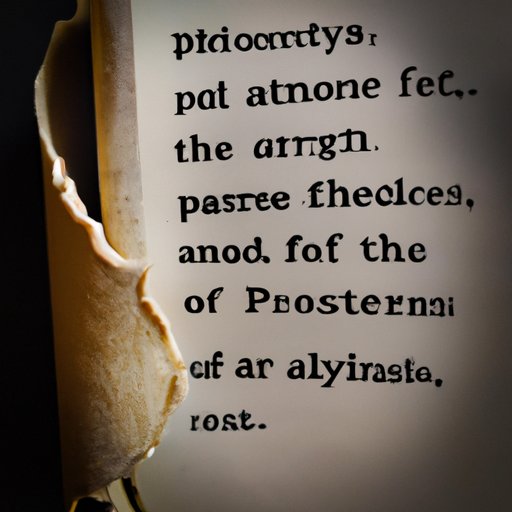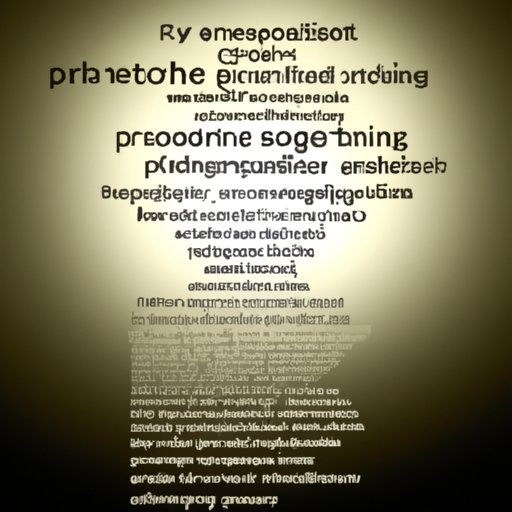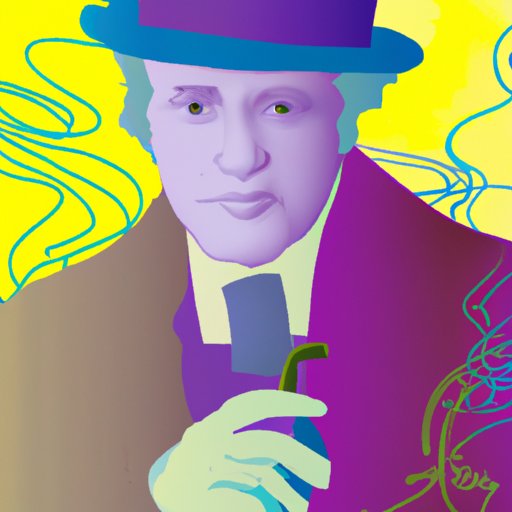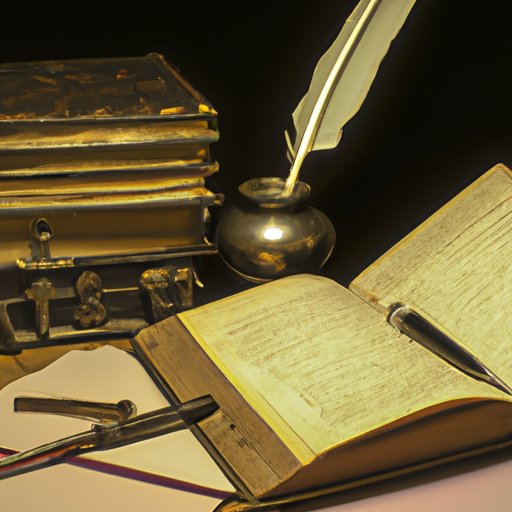Introduction
Poetry has been a part of human culture for centuries. It is a powerful form of expression that can convey emotion, ideas, and stories in a unique and beautiful way. But who was the first person to invent poetry? This article will explore the origins of poetry and attempt to uncover the mystery of who first put pen to paper and wrote this ancient art.
A Historical Look at the Origins of Poetry
The exact origin of poetry is unknown. However, there are several early examples of written poetry found in ancient civilizations around the world. In Mesopotamia, for example, some of the earliest known poems date back to 2000 BC. These poems were written primarily in Sumerian and Akkadian languages and often incorporated religious themes. Similarly, in Egypt, the Pyramid Texts, which are believed to have been written between 2400 and 2300 BC, contain some of the earliest known written examples of poetry.
In addition to these early examples, it is believed that oral poetry existed long before it was ever written down. These oral traditions likely involved storytelling and recitation of stories, myths, and legends. As time progressed and writing became more widespread, these oral traditions began to be recorded in written form, which eventually led to the development of the modern-day poem.

Exploring the Ancient Art of Poetry
Poetry has evolved over the centuries and today there are many different types of poetry. Some of the most common forms include lyric, epic, ballad, ode, and sonnet. Each type of poetry has its own distinct characteristics and style. For example, lyric poetry is typically short, expressing emotion or personal experience, while epic poetry is usually longer, telling a story or providing a commentary on a particular topic.
In addition to its various forms, poetry has also played an important role in many ancient cultures. Poetry was used as a way to express feelings, give advice, tell stories, and pass down traditions. In many cultures, poetry was also associated with religious ceremonies, rituals, and other spiritual practices.
Who First Put Pen to Paper and Wrote Poetry?
While it is impossible to pinpoint exactly who invented poetry, there are several key figures throughout history who have made significant contributions to the development of this ancient art. One such figure is Homer, who is credited with writing the two epic poems The Iliad and The Odyssey. These works are considered some of the most influential works of Western literature and are believed to have been written around the 8th century BC.
Another important figure in the history of poetry is the ancient Greek poet Sappho. Her work is renowned for its passionate and emotional lyrics, which are said to have influenced later poets such as Virgil and Ovid. Additionally, the Roman poet Horace is also credited with making significant contributions to the development of poetry. His work focused on topics such as morality, ethics, and social norms, and his influence can still be seen in modern-day poetry.

Examining the Evolution of Poetic Expression
Throughout the ages, poetry has gone through many changes in terms of both form and language. In the Middle Ages, for example, poetry was heavily influenced by religion and was often written in Latin. By the Renaissance period, however, poetry had shifted more towards secular topics, with writers such as William Shakespeare using blank verse to explore themes of love, loss, and politics.
In addition to these changes in form and language, social and political factors have also had an impact on the development of poetry. During times of war and conflict, for instance, poets often used their work to express their views on the events taking place around them. Similarly, during periods of peace and prosperity, poets often wrote about the beauty of nature and the joys of life.
Tracing the Development of Poetry Through the Ages
Throughout the centuries, poetry has grown and evolved, with notable works and movements contributing to its development. In the 18th century, for example, the Romantic period saw a resurgence in poetic expression, with poets such as Wordsworth, Coleridge, and Shelley exploring the power of nature and the inner emotions of the human heart. Similarly, the 19th century saw the rise of modernist poetry, with writers such as T.S. Eliot and Ezra Pound experimenting with new forms and styles.
The influence of poetry can also be seen in other forms of literature and in society as a whole. Poets have inspired generations of writers and have shaped the way we think and feel about the world around us. They have also provided us with a unique perspective on our shared history, allowing us to gain insight into the beliefs and values of past cultures.

The Inventor of Poetry: Uncovering the Mystery
Despite the numerous theories regarding who invented poetry, the answer remains elusive. Some believe that poetry originated in Africa and was passed down orally from generation to generation. Others argue that it was invented by the ancient Greeks, while still others suggest that it was the product of multiple cultures and individuals. Ultimately, it is difficult to say definitively who first wrote poetry, but it is clear that it has been an important part of human culture for centuries.
One thing is certain, however; the invention of poetry has had a profound effect on the course of human history. Poetry has allowed us to express ourselves in ways that other forms of communication cannot and has given us a deeper understanding of the world around us. It has also provided us with a means of connecting with one another, allowing us to share our stories and experiences in a meaningful way.
Conclusion
The invention of poetry is shrouded in mystery, but it is clear that this ancient art has had a lasting impact on our culture and our lives. From its earliest beginnings to the present day, poetry has evolved and adapted to changing times and contexts, while remaining a powerful form of expression. Although we may never know who first wrote poetry, its influence can still be felt in literature, society, and our everyday lives.
(Note: Is this article not meeting your expectations? Do you have knowledge or insights to share? Unlock new opportunities and expand your reach by joining our authors team. Click Registration to join us and share your expertise with our readers.)
